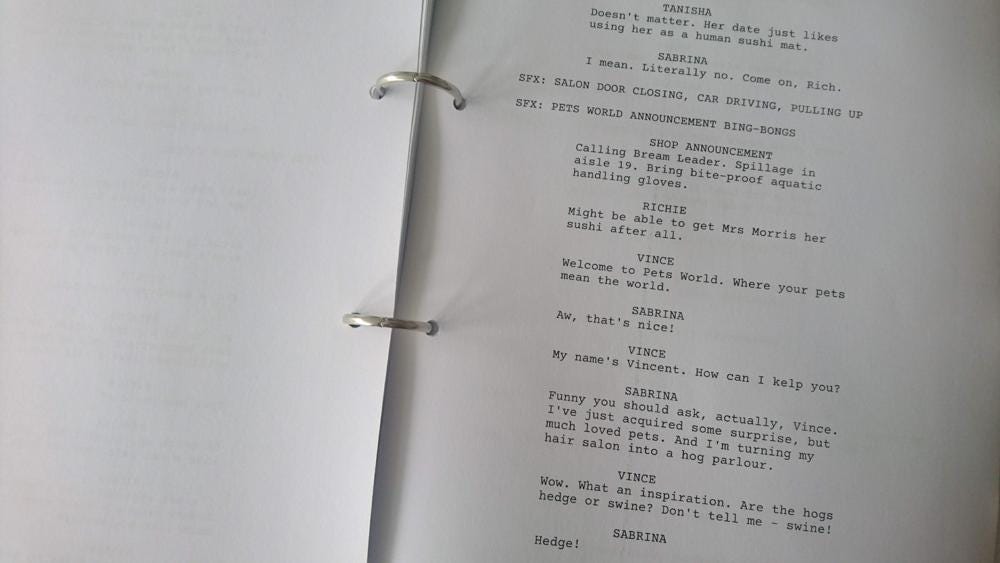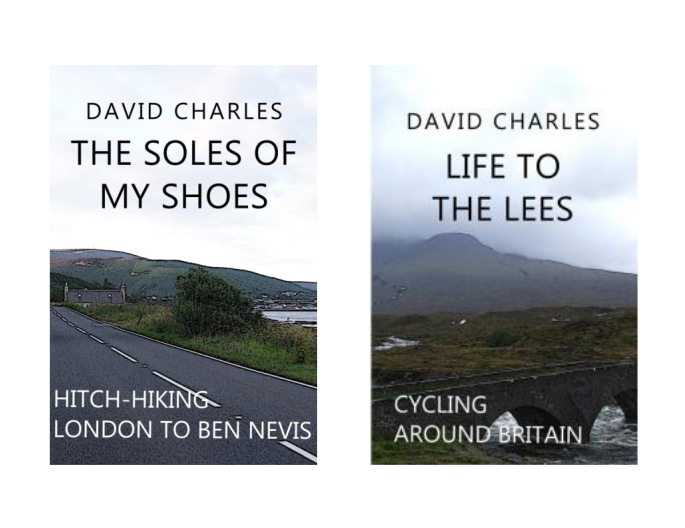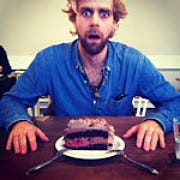What does it take to write a BBC sitcom?

Happy Friday!
The scripts are in! We record tomorrow!
In our third year of Foiled, I feel like I can say something about the rhythms of writing a radio sitcom. Settle in, this is a long read.
Writing a sitcom episode is like building a house. Kinda.
In reality, Beth and I usually start laying bricks before we've got any blueprints. If you hired us as builders, you'd probably want your money back.
Whether any of those early bricks make it into the final building is a matter of luck. The risk is that we'll fall in love with some clever brickwork, which makes it all the harder to tear the folly down later.
But it feels good to write ourselves into the series, reacquaint ourselves with the world and the characters. Unlike in construction, in writing nothing is ever really wasted.
Typing through a script, once the plans are finally in place, is pretty easy now we're in our third year – a matter of placing one brick alongside another and remembering cement. By this point, we know the returning characters back-to-front; and the hardest part is always putting together the episode's new characters.
Once a story is written out from start to finish, it's clear where the problems are. We can start the heavy manual labour of ripping walls down, moving the bathroom into the kitchen, and adding a loft conversion. This part of the process feels very physical - huge swathes of script cut and, sometimes, pasted.
As the story sorts itself out, we move onto the fine work of painting and decorating, sanding and polishing. At this point, we can stand back and admire our handiwork, or – as so often happens – realise that the whole edifice is about to collapse and we need to buttress our walls or tear them out.
The timeline of construction
Foiled was re-commissioned at the end of 2018. The first mention in my diary of any writing comes in mid-February. We were slow to get started, basking in the glory of a commission, putting off the actual labour.
By this point we'd already got the broad ideas for stories: something about a work exchange, something about hedgehogs, and something about a cash and carry. It's not a lot to go on.
We really started working on the scripts from the beginning of March, with ten days together in London. By the end of this spell, we'd pulled together the 'beats' of each of the episodes, and run them past the producer with mixed results.
The ten weeks through the rest of March, April and May were mostly spent working separately, with increasing dedication.
By the end of April, we'd sent the producer first drafts of two of the episodes. The third episode follows in early May. The producer sends us notes. We tear our hair out in gratitude.
The week before the writers rooms, we send the producer what we think will be approximate working drafts. We're wrong, for two of the episodes at least. Frantic re-writes ensue.
The two days of writers rooms at the end of May give a burst of energy to all three scripts. Which is handy because we only have 9 days before the recording.
Luckily, by this point I'm in London and Beth and I can work together more closely, in the high-rise, riverside solitude of my friend's flat in Woolwich (thanks Tim!).
A hangover the day after the final writers room doesn't help, but long days mean that by Monday lunchtime we can send the producer what we think are two finished, record-worthy scripts – Episodes 1 and 4.
Again, we're wrong about one of them – something we realised only yesterday.
In the meantime, we go over the final script – Episode 2 – with a fine tooth-comb, tightening the nuts and bolts of the story and turning place-markers into zingers. We send it off on Wednesday morning in a blaze of emotion.
Why are we doing this, again?
That night, I re-read Episode 4. After two days' creative distance, and having raised the bar with our work on Episode 2, we decide that the mid-section is completely wrong. One of the characters is just floating along and a pair of titanium toaster tongs appear at the episode climax for no discernible reason.
It's not just the amount of work needed that's a concern. The scripts have already been sent to the actors and the sound engineers have already done the work needed to make sure all the SFX are in place. A new script for Episode 4 is completely out of the question.
So yesterday morning, I start working on the re-working, and Beth starts working on the producer. She jokes that she'll pull out of the project if he doesn't accept the new script. At 2pm, with the 'new' script almost finished, I go for a swim in the Thames to await his answer.
None of us do this for the money. I don't think the producers have made more than a few pennies from Foiled. Beth and I get paid, of course, but it's not much more than minimum wage.
The only real reason for writing and recording Foiled is for the sake of the work itself. This is our creative reputation. Tomorrow's recording will almost certainly outlive all of us. The oldest recording in the BBC archives is dated to 1890. The scripts that go into St David's Hall tomorrow will be humbly printed on eternity.
So it's fair to say that my leisurely swim yesterday was quite stressful. Could I even bear to sit in the room as the old script was being recorded?
The good news is that our producer gave the new script the green light. And we worked into the summer dusk sanding and polishing Episode 4. It's now a piece of writing that I'm proud of and I reckon it might make you laugh.
So the writing is done. All that remains, for me at least, is to send one of the actor's a recording of my sister's partner speaking Danish, and to get myself to Cardiff tomorrow.
Oh – and then start work on Episode 3, which we'll record in a studio in London at some point over the next month. The cycle continues!
~
For those of you interested in a more detailed breakdown, the first two weeks of March involved about 8 hours per week of script-writing. We stepped up script-writing to about 11 hours a week for the seven weeks from the beginning of April up until the week before the writers rooms at the end of May. For the last three weeks I have done almost nothing other than work on Foiled: more than 20 hours a week on script-writing alone.
I write this not to show off, but to show you honestly the work it takes to write three episodes of a radio sitcom: about 150 hours of pure script-writing, plus plenty of other work behind the scenes on story-writing and talking things over with Beth and the producers.
~
If you haven't already got your tickets for the Foiled recording tomorrow then you might want to click here. Everyone's invited and you'll get the chance to hear your distinctive laugh on the BBC so that's fun.
If you like this sort of thing, then you'll probably also like my back catalogue of over 500 posts, all found at davidcharles.info.

I've published 5 books, including stories of hitch-hiking from London to Ben Nevis, and cycling 4,110 miles around Britain. Visit my tiny book shop.
The ebooks are Pay What You Want, so you choose the price tag. Can't say fairer than that.
By complete coincidence, I got an email this morning from a man who saw Foiled at the Edinburgh Fringe in 2016.
We met you in George Square gardens in 2016 when you talked us into coming to see Foiled that afternoon. Brilliant!! We’ve raved about it ever since and watched its success since then. Just wondering if you’ve written anything else we can see?
It blows my mind to think that there are people out there who, years later, are still thinking about the work that we've done. This is what I mean when I say that we don't do this for the money.
Series 3 of Foiled - indeed all of Foiled since 2013 - has been a wonderful experience; thank you for your support and I really hope you enjoy listening as much as I've enjoyed writing.
But before the recordings, I'm driving over to a wood near Hook in Hampshire for a top secret sylvanian pow-wow with the other members of the Inner Thighs cabal. I'm looking forward to practising driving a massive van, getting on bike, and generally not staring at a computer screen for a while.
Much love, - dc

CREDITS
David Charles wrote this newsletter. David is co-writer of BBC Radio sitcom Foiled, and also writes for The Bike Project, Forests News, Elevate and Thighs of Steel. Reply to this email, or read more at davidcharles.info.


